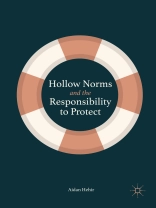This book explains why there is a pronounced disjuncture between R2P’s habitual invocation and its actual influence, and why it will not make the transformative progress its proponents claim. Rather than disputing that R2P is a norm, or declaring that norms are insignificant, Hehir engages with post-positivist constructivist accounts on the role of norms to demonstrate first, that the efficacy of a norm is not directly related to the extent to which it is proliferated or invoked, and second, that in the post-institutionalization phase, norms undergo both contestation and (potentially regressive) reinterpretation. This volume analyses the evolution of R2P, and demonstrates that it has been steadily circumscribed and co-opted, so that today it has no power to meaningfully influence the behaviour of states. It is essential reading for academic audiences in the disciplines of International Relations and International Law.
İçerik tablosu
1. Chapter 1/Introduction: ‘R2P has begun to change the world’.- 2. Chapter 2: The Rise of R2P and the Fall of Human Rights.- 3. Chapter 3: R2P and the Limits of Norms.- 4. Chapter 4: Sovereignty as Authority: State Support for R2P.- 5. Chapter 5: Sovereignty as Liability: The Security Council and R2P.- 6. Chapter 6: Norms and Mass Atrocities.- 7. Chapter 7: Critics or Courtiers?: R2P and the Status Quo.- 8. Chapter 8/Conclusion: After Failure
Yazar hakkında
Aidan Hehir is Reader in International Relations and Director of the Security and International Relations Programme at the University of Westminster, UK.












